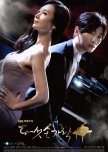Această recenzie poate conține spoilere
A must-have for makjang-lovers. A roller coaster of evil where you end up feeling for the worst, too
"Five Fingers" is a must-have for all those who love "makjang". A roller coaster of evil... and it doesn't stop. The spectators are allowed to tear their hair, wriggle, turn, annoy themselves to the bitter end... It's about the piano, too - some battles take place while playing, being around and doing business with the grand piano.
This is about family and South Korean family values/virtues in particular. Submission to the value system is declined as a virtue in all its fatality. In the interweaving of events, the viewer inevitably faces the question again and again: is it virtue or stupidity, virtue or impertinence, virtue or arrogance?
The series dates from 2012 and makes a cunning attempt to challenge viewers to confront the value system. The rebellious thoughts inevitably arise in the minds of the viewers, because the well-meaning decisions that the protagonists make over and over again drive the values surrounding family (love) to the absurd and trigger suffering one after the other.
The ambivalence inherent in this is exploited perfectly. The actors do their part.
With 30 episodes there may be a tendency to flee in between, but I don't know anyone who didn't stick it out to the end. The ending may not be the classic happy ending, but it may be the true happy ending: the wheel of fortune comes to a standstill. Peace.
At first glance, the greed for money and power seems to be the driving force behind all evil. But actually it is the greed for love and recognition. The wheel of fate and suffering has already been turned on long before the protagonists - the two half-brothers In-ha and Jin-ho - compete against each other. To a certain extent they live out the unresolved conflicts of their parents. If you want to ask who is to blame for everything, then the root goes back a long way. The father pulls the strings out of the grave and it goes even further. A nice psychological study. Especially since you can't help but feel sympathy for everyone, even the worst troublemakers.
This is about family and South Korean family values/virtues in particular. Submission to the value system is declined as a virtue in all its fatality. In the interweaving of events, the viewer inevitably faces the question again and again: is it virtue or stupidity, virtue or impertinence, virtue or arrogance?
The series dates from 2012 and makes a cunning attempt to challenge viewers to confront the value system. The rebellious thoughts inevitably arise in the minds of the viewers, because the well-meaning decisions that the protagonists make over and over again drive the values surrounding family (love) to the absurd and trigger suffering one after the other.
The ambivalence inherent in this is exploited perfectly. The actors do their part.
With 30 episodes there may be a tendency to flee in between, but I don't know anyone who didn't stick it out to the end. The ending may not be the classic happy ending, but it may be the true happy ending: the wheel of fortune comes to a standstill. Peace.
At first glance, the greed for money and power seems to be the driving force behind all evil. But actually it is the greed for love and recognition. The wheel of fate and suffering has already been turned on long before the protagonists - the two half-brothers In-ha and Jin-ho - compete against each other. To a certain extent they live out the unresolved conflicts of their parents. If you want to ask who is to blame for everything, then the root goes back a long way. The father pulls the strings out of the grave and it goes even further. A nice psychological study. Especially since you can't help but feel sympathy for everyone, even the worst troublemakers.
Considerați utilă această recenzie?


 9
9 39
39 15
15
















